Full Episode: Gov. Kathy Hochul & Her First Year in Office
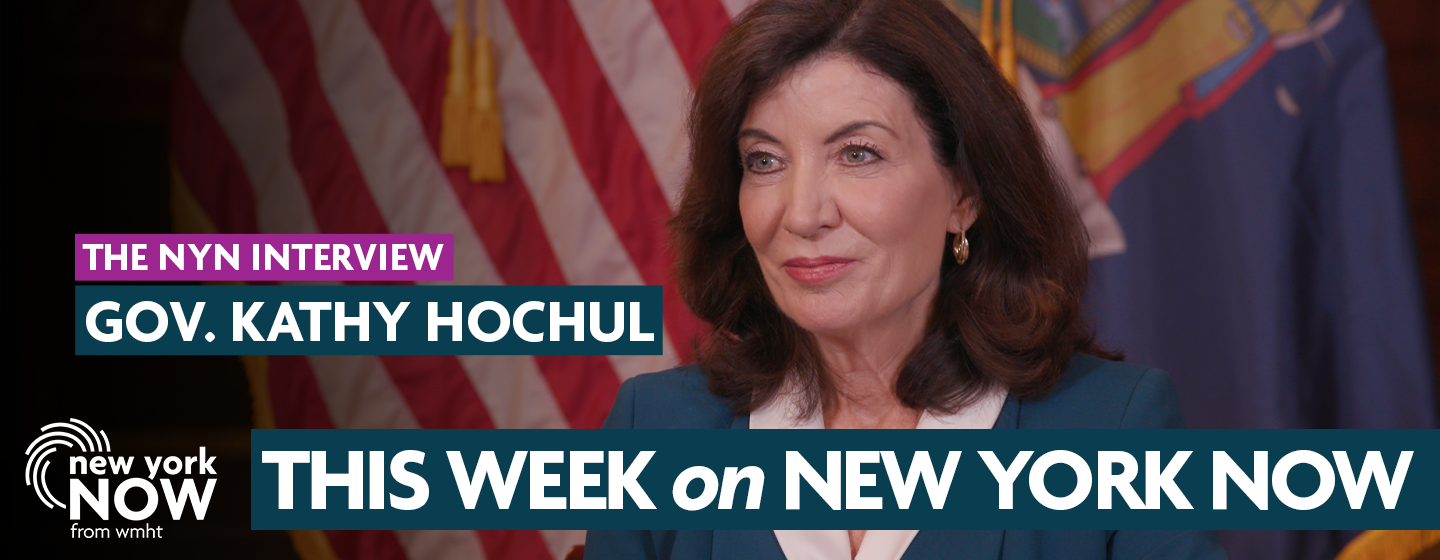
Gov. Kathy Hochul & Her First Year in Office
Full transcript of New York NOW's Interview with Gov. Kathy Hochul:
NYN: Governor, thank you so much for being here. I appreciate it.
KH: Thank you.
NYN: Of course. So, it has been a long year with you in office. Can you tell me, I'm curious, are you a different person now than you were at this time last year, you think? I am definitely a different person.
KH: That's a great question. Under the theory, if it doesn't kill you, it makes you stronger, I feel stronger. I feel more confident. We've had many successes that people thought were impossible. We’ve really talked about how we've governed in a very different way.
And I said, I'm going to come here and restore people's faith in government. I've worked hard to do that, but I've also felt this inner strength that perhaps I didn't even know was there that's had to come out in so many really challenging circumstances. So, I feel even more confident today than I did a year ago.
NYN: Something I've always wondered about were those two weeks between when the former governor, Andrew Cuomo, announced his resignation, and then he actually resigned and you became governor. Can you take me back to what those two weeks were like for you?
KH: It was a blur. All of a sudden, our lives were turned upside down, but in a way that I knew I just needed to take the time to prepare. I was reading budget books and procedure books and talking about assembling a team of individuals. I wanted to have the most diverse administration in history.
We've accomplished that, because I knew there were a lot of people that would not continue in office on the first day, and I had to have a team in place. My top leadership, primarily women, strong women, and I have a real talent for attracting talent. My communications team is second to none. Our secretary to the governor, bringing on Karen Persichilli Keogh, bringing on Kathryn Garcia, strong policy people.
I'm really fortunate that, during that time, I could start in quick-time. We didn't have a lot of opportunities for vetting and things, but I had to pull together a team because literally one week later, we're dealing with a hurricane, and kids going back to school, and the uncertainty of COVID and masks, or no masks and vaccines. We had a lot to deal with in a short time, so those two weeks were part of preparation just for the position itself.
NYN: A week in, Ida hit New York. We're coming right up on the anniversary. Take me through that response for you. It was the first really major thing you had to deal with as governor. It was a tragic event, and I know you went right down into Brooklyn and Queens, I think the day after.
KH: We did. We were there immediately. It was emotionally heartbreaking. You walk in and you see this — people have been living in really substandard conditions in basement dwellings because that's all they could afford. And the water, raging waters, came down a street and just — the water was up to the ceiling and people were drowning in their homes. I talked to one man who just escaped by breaking through his windows. He almost got stuck, and he would have drowned.
So, it was emotional, but I also knew I couldn't dwell in my own feelings. I mean, I'm feeling strong empathy for people, but I had to jump in action. They needed to see that I was a leader who could bring in the resources. Okay, federal government, what are you doing, FEMA, my state team, how do we just lift people out of this?
And what I also saw was that I met everybody who lived in an area — they were devastated, and I think they thought everyone just shows up, and the president's there and the cameras are there. And I could see in their eyes that they didn't trust that we'd really be back and help them.
So I went back the next day, just by myself with just a couple of local leaders, no cameras. And then I also went back a third day. I had to show them that I'm in this for the long haul, that we are here to help you. We mean that sincerely. And I could see a sort-of trust in their eyes that they knew they had a leader now, who really would look out for them.
That was a real defining moment, in literally the first week, that set us on a path to say we have to restore faith in government, and a lot of it's just showing up — showing up and saying, I'm here to help you, I'm going to get you out of this. So it was a challenging situation, but we rose to it and I'll be back there again shortly to see how people are doing, making sure that their lives are better one year later.
NYN: Tell me how that reflects on your personal governing style. I've known you since you were lieutenant governor, you seem to have a personal touch with people that other lawmakers and elected officials don't always have. How important is that to you?
KH: It's everything. It's everything. I grew up in a household with a mother who taught me empathy. She had a very difficult childhood — being abandoned and an alcoholic father, an abusive father and all these other things. Her mother died when she was young, and she had to raise younger kids. She could have been hardened by that experience, but it made her more caring about other people.
I learned that at a young age, as a child going into the homes of people who lived in great poverty, even though we didn't have much. I've always been that kind of person, where I draw energy from other people. I seek them out, I go to where they are, and if they're in trouble or in stress or feeling worried about, you know, crime in their neighborhood, I'm showing up and saying “I've got your back, I'm helping you.” So, that's who I'll always be.
I am most unhappy in this job sitting behind a desk. We had a lot to do during the budget process and I had to stay in Albany for many, many weeks. And we have our responsibilities, but once the end of session came, and I could walk around, sit in a Jackson Heights diner the other night or go the Troy Farmers Market with a new grandbaby a couple weeks ago.
NYN: I didn't know you were there. That's my favorite farmers market.
KH: It was fabulous, yes. I was pushing the baby around in the stroller. I was showing her off to everybody.
And I've been back in Buffalo many times because of the devastation my hometown went through with the slaughter, the massacre, of innocent people in a grocery store. So, I believe in showing up. You show up with people and resources on your side, and you do it again, and again, and again. That's how we build that trust, and I'll always do that.
NYN: You've done a lot of that over the past year. What do you see as your defining moment? What do you want people to take away from the last year to associate with you? There's been a lot between Omicron, the budget, State of the State, and, as you said, the awful shooting in Buffalo. A lot has happened.
KH: All those combined. But also just in the final weeks of the legislative session and the Supreme Court decision. You know, really having to stand up and be a voice, not just for our state, but nationally and say that we are going to stand up, protect the rights of women to have an abortion or the right to choose, and not have government-mandated pregnancies, which is the outcome when so many states where you see now — one out of three women are living in a state that's hostile to their rights.
I needed to stand up on that issue, but also on guns. We do have a gun crisis. I have worked with the State Police to bring together resources. Nowhere else in the country — we have nine states that I brought together and said, you work together, you start sharing data. And this week, the head of ATF for the country is coming to New York to see how we did this, how we've gotten thousands of guns off the streets.
Those are areas where it's not one example, but it's also saying we’ve got a problem, I'm going to solve it. I was on a zoom call with everybody in Rochester talking about their spike in crime and how, three weeks ago, I gathered everyone, said we're doing things differently, crime's starting to head down. And maybe that's the trend, maybe it's not, but I've got my hands on all this.
And so, gun safety, undoing what the Supreme Court did in saying we couldn't have a concealed carry law to protect us from people who might want to carry a gun in New York City on a subway, or on a bus upstate, or at a sporting event, or a park, or a school, or a church, or a synagogue. Our laws are going to be turning that around and saying no, I still have the power to protect the citizens of my state. We respect your rights. But, also, you don't have a right to carry a gun anywhere you want.
I've had to rise to those national challenges in addition to the state's own challenges with guns, gun safety laws, protecting women's rights, while making sure that we invest in our healthcare — $10 billion to help lift up a battered health care system that was crushed under the weight of the pandemic. A thousand new people have scholarships, full rides to become nurses. We gave bonuses to people in health care because they felt so unappreciated — record spending for education so our schools can have health care professionals, mental health experts to help our kids get through what has been an excruciating time.
I'll never be able to point to one accomplishment, but we have gotten our hands out there and focused on so many issues that New Yorkers want us to. We work hard. We put in long days. I've got a team that's second to none, and that's how we're making a real difference in the state.
NYN: You've had your challenges as well over the last few months just alone. Your former lieutenant governor, Brian Benjamin, was indicted on federal corruption charges — not related to his job as lieutenant governor, but a race that he was running in New York City for New York City comptroller at the time.
You've described that as personally disappointing, because he had to resign, obviously, and it shook up your politics. What would you have done differently if you could go back? Do you wish that you had taken that process a little bit slower, done some more vetting? Or do you think it wouldn't have made a difference?
KH: Exactly, you've hit on exactly what was going on. One year ago, during that two week period, when I didn't have a staff, I didn't have the resources to do the normal vetting. You know, I knew the lieutenant governor from my visits to Harlem and appreciated his work as a senator. And there was a good relationship. I didn't properly vet and I've accepted that.
It was disappointing, and it happened right around budget time, but I have assembled the greatest team. From my commissioner of health, Dr. Mary Bassett, who left a major position at Harvard to come back. And Kathryn Garcia, who was this close to being the mayor of New York City. I mean, she's extraordinary, to run our state operations. The best attorneys I could find, Liz Fine. Communications team, as I mentioned. Karen Persichilli Keogh.
I have the all-star dream team. And they have helped me build a system that is responsive, and has taken the whole idea of public service to the next level. And I really want that to be one of our legacies, that people, like I was as a young person, inspired as an intern, when I was 18 years old, for the New York State Assembly. I believed in the power of government to do good even back then, and I've never lost that.
I want young women in particular to have doors open to them in our administration, to build a team like I was part of. And that's what we're going to continue to do. So we've had some mistakes, corrected them. I have a great lieutenant governor, Antonio Delgado, really proud of the perspective he brings to the job, his experience. And we're back on track.
NYN: You brought up crime before. I want to see where you're thinking on that because there's a lot of different ideas on how to reduce crime in New York and across the country. We've seen a national crime wave. Republicans have blamed it on bail reform here in New York. I know that you don't share the same opinion.
But, I'm wondering, what do you do about crime going forward? Are we doing all the right things, and we just have to wait and hope that they all work? Or are there more things that you would like to do?
KH: I think about this first thing in the morning, last thing at night. I truly do. I don't want anyone to be harmed by or victimized by a crime, and they deserve to have security and safety. I believe in targeted changes, as we've done with the bail reform. We now have gun cases covered, hate crimes covered, repeat offenders now covered.
Those are there for the district attorneys and the judges to follow. That should result in a reduction in crime. But there's other areas. That's just one approach, and that's not responsible for the nationwide increase in crime, as you mentioned. We're still the safest state, the safest big city, New York City, in America, even though crime is up everywhere.
But as long as there are people who are anxious about it, I'm anxious about this. I'm going to focus on it. But we also have enhanced red flag laws, getting the guns out of hands of people who, whether it's through social media, or in other ways in a school, have telegraphed that they have been tempted to do harm to themselves or someone else. We've been aggressive in that we now have a record number of cases that are being brought with those extreme risk orders of protection.
Making sure that after the Buffalo massacre, that an 18-year-old can't walk into a store and buy an AR-15, as in this case, went down to Pennsylvania, got an enhanced magazine and was able to do something that should only have occurred on a military battlefield. So, we changed that law. You now need to have a background check to buy ammunition, we're going to have enhanced training.
We've made changes to laws that people said were not possible. But through shear force and cooperation with the Legislature, we got them done. So, it is a multifaceted approach, and one that I'm not going to let up on.
I just was on calls with everybody involved in law enforcement in the city of Rochester to help them get their crime rate down. And in the last three weeks since I last convened them, the numbers are trending in a better direction because we now have a better relationship. Our State Police are embedded in the Rochester Police Department. So that's what I'm doing, is finding out where I can be most helpful to help local law enforcement be able to reduce the crime rate.
NYN: Republicans have really placed all the blame for the crime problem on Democrats. How much of this do you think is political? You've mentioned before that you may think judges and prosecutors aren't using all the tools that they have effectively. How do we change that? Is it just about the more training that you've mentioned as well? How do we make sure that these laws are being followed in a way that they were intended?
KH: You're absolutely right about Republicans trying to politicize this because when it comes to smart gun safety legislation, they oppose it. How do you say you're trying to stop crime, and yet you oppose, verbally said, you would not support our enhancements to the red flag laws? You oppose our efforts to restrict who can carry a concealed carry weapon. I mean, how does that match up? Most serious crimes are being committed with guns, illegal guns from another state.
So that's inconsistent right there. That shows that they are just politicizing something because they can. But people need to say, what are you doing about guns? Guns are the ones that are killing people, people with guns. So, that's just a non-starter as far as I'm concerned. You have no credibility to question what we're doing when you won't support our gun safety legislation.
NYN: I also feel like this is one of those issues, the bail reform issue, that the public doesn't really understand as much as we do. We read these bills, we talk about it every day it seems. And everything just seems to be kind of jumbled in this political mess on television through ads, online through ads.
That brings up my point of your first full term, looking to next year. You have an election in November for the governorship. It'd be your first full term in office. What's at the top of your accomplishments list? What do you want to get done while you're there?
KH: And we'll continue to focus on public safety. We'll continue investing in, as we have, triple amount of money going to the violence disrupter programs in cities, where the crimes are being committed, making sure that our police have the resources they need, that they will continue to do the work we want them to do and support them.
But also, aside from public safety, we have a real affordability crisis. I am laser focused, not just on the $25 billion record amount of money we're putting toward building 100,000 affordable housing units. But what other strategies can we use? Whether it's changing zoning, transit-oriented development.
There are ways that we can make this state more affordable for everybody — from the young people that are literally fleeing Silicon Valley. Young people with technology backgrounds and degrees are coming to the state in search of the energy and the vibe. It's not just New York City, it is upstate as well. What I'm seeing in Albany and Rochester, Syracuse, Utica, Buffalo, Binghamton — it is transformative.
The jobs that are coming here — I literally sat down with a major major company, talking to them about the talent we have in New York State, upstate. And people want to live here, but what has happened after the pandemic, people discovered many of our communities upstate, the price of housing went up. And I want people to be able to have the joy of homeownership. That's how you build wealth.
We're focusing on more strategies, and I already announced some, but we’ll continue to announce more strategies to give first time homebuyers an extra lift, and to make it easier for them.
So, that'll be one of our top positions, as well as continuing to stabilize the healthcare industry. I said I want to increase the healthcare workforce by 20% in five years. Now it's down to four years. So we have to continue focusing on stabilizing that, as well as focusing on education.
The kids were hit so hard by the pandemic. We need to give them a good education, but also probably mental health services where many wouldn't have needed it before. But let's take the stigma away. Your child's struggling. That's okay. A lot of kids are struggling. And we have to start investing in helping get them through the trauma that they just experienced with this pandemic.
NYN: Yeah, I think for everybody. I think everybody after the pandemic is dealing with mental health issues, unparalleled. I mean, I just took a month off of work, for example, just because of that reason. You just need to reset a lot of these times.
KH: Andit's okay. We have to say to people, it's okay, we're all human. We've been through a lot.
NYN: Exactly. We've been through so much in the past few years. I want to go back to schools for a second. The state is ending a lot of the COVID restrictions that were in schools to align with CDC guidance. How hard was that a decision for you? Was it easy just seeing the numbers and saying, "Okay, now we don't have to do this?” Or was it a more deliberative process?
KH: We analyze the numbers nonstop every single day, looking at the numbers and the trends. Where we were this time last year, we were in a very good place. Now, all of a sudden, kids are back in school, people back indoors, the numbers started going up. And then they started coming down and we're thinking by November, we're in good shape.
And then, the end of November, Omicron shows up, and we were the first state to really take that seriously. We started amassing testing kits. We have more test kits in the state of New York than probably the entire country because I knew we had to do this. My fear was that this would spread, and kids wouldn't be back to school in January. I had to make sure that kids stayed in school.
We're very experienced now in what to look for. So those restrictions, because of the availability of the test kits, realizing that the data is showing what's really causing the virus to spread, and it's not spreading in schools. So, why not take away some of those stressors that are associated with reminding people that we've been through a pandemic?
When we don't need to, we won't. When we need to put in restrictions, we will. I don't want to be just continuing things because they've been there. But I've said to everybody, if we see a trend, numbers start going up. we're going to talk about things differently.
But for right now, I'm empowering New Yorkers. Make sure you're vaccinated, get your kids vaccinated, be smart about it, protect yourself and if more boosters come out, be first in line, get them and I'll always make sure we have supply. That's what I have to continue doing. I don't ever want to have supply chain shortages when it comes to protecting the health of New Yorkers.
NYN: The Omicron booster is going to be coming out here in the next few weeks, hopefully fingers crossed. Are we ready for that?
KH: Yes. We have to take what the federal government gives us. So, there's always more demand than supply initially. But we have the exact opposite now. If you want to get a vaccine, something that was scarce a year ago, you can get them on a street corner. They're everywhere.
And really, everybody should be doing this because this is going to be around for a while. And our hospitalizations are down. We still lost 25 people to COVID in our state yesterday, but we're definitely in a better place. But we're in a far better place if we can get more people vaccinated.
NYN: It's hard to think that we're in a better place when you see those deaths every day. You're looking at this data every day. I skip some days. How does that weigh on you?
KH: I have to do this. I'm the governor of New York. I'm responsible for the public health and safety of everyone who calls themself a New Yorker. I take that very seriously.
NYN: Is it hard?
KH: It's my job. I have to do this, and I embrace it. It's an absolute honor to be the governor. And yes, there's a certain weight that's on your shoulders. But I lean into it. You know, this is not for the faint of heart. I run into this and say “I can do this.” People need to believe. They need to know that their governor has got their back.
NYN: We're just about out of time. I need to ask you about this because I love following legal news in New York. It's one of my passions.
You're going to have the chance to pick a new chief judge here in the next few months. What kind of person are you looking for? Some people really want you to pick somebody with experience in public defense, versus prosecution. Do you have any idea of the person that you're looking for?
KH: There will be no litmus test. No one will be disqualified because of their particular background, whether they were a public defender, whether they were prosecutor, whether they are an existing judge, whether they're an academic or someone from the private sector.
What I'm looking for is the opportunity to build this court, to honor the legacy of the past, when U.S. Supreme Court justices used to be taken from the New York State Court of Appeals. I want a true jurist, someone who has demonstrated the ability to weigh both sides of an issue, and come down and do what's best for the people of our state.
I have to caution everyone that I don't have the chance to pick anyone I want. There is a screening process. And obviously, the people on the screening committee were selected before I became governor. So there's that dynamic, but also, they will narrow it down to seven people, and then I select among the seven. But my expectations are clear. There are no disqualifiers on anyone's past professional background, despite what people may be asking for. I won't do that. I deserve to have the very best.
NYN: Do you want to pick somebody who's already on the court to fill that job? Or does it matter?
KH: I will be looking at the seven. I look at seven people. I don't know who's going to be in that category. But I don't want anyone to not apply because of their own background. And if they feel they have what it takes and have that disposition to be a leader, I need someone who actually can oversee a vast bureaucracy, one that has been under a lot of stress because of the pandemic when we went for such a long time without jury trials.
One of the reasons there's people out there who have been accused of a crime and perhaps recommitting crimes is that they're awaiting a trial that’s taking years to happen, because nothing happened during the pandemic. There's a lot to rebuild there. So, this has to be a person who has a vision for stabilizing, but then also lifting up the entire system, to make it worthy of the name of the New York State Court of Appeals.
NYN: It's going to be really interesting. Maybe for me, maybe not for everybody, but I like it. It's interesting.
KH: It's important when you see the weight of the decisions that they have before them, and they do directly affect the lives of New Yorkers. This is very important.
NYN: Absolutely. We're out of time. Gov. Kathy Hochul, thank you so much for sitting down with us.
KH: Thank you, Dan.
On This Week's Edition
Catch this week's show on your local PBS station, or watch on YouTube, Facebook, or using the free PBS app anytime after Friday.
On This Week's Edition of New York NOW:
- Gov. Kathy Hochul joins us for an in-depth interview on her first year in office, and her pitch to New Yorkers for a full term in this year's elections.
Related
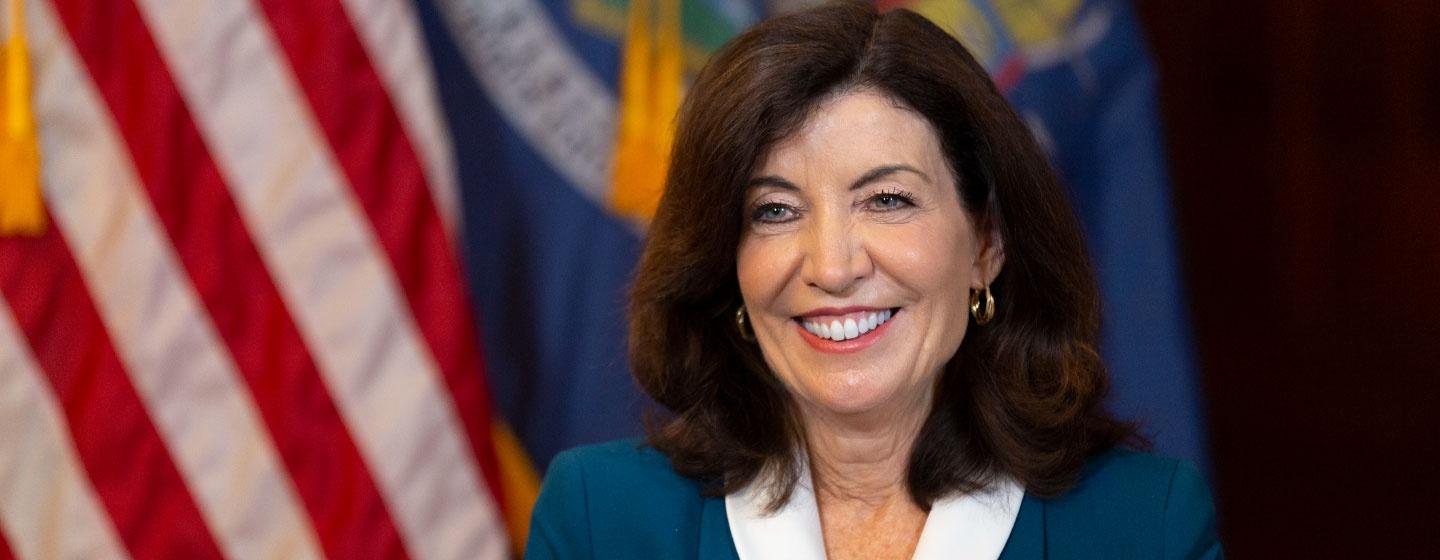
One Year After Becoming Governor, Hochul is Running Strong to be Elected to the Job
It's been a year since Kathy Hochul became the state's first female governor. Now, she's aiming to be elected to the post.
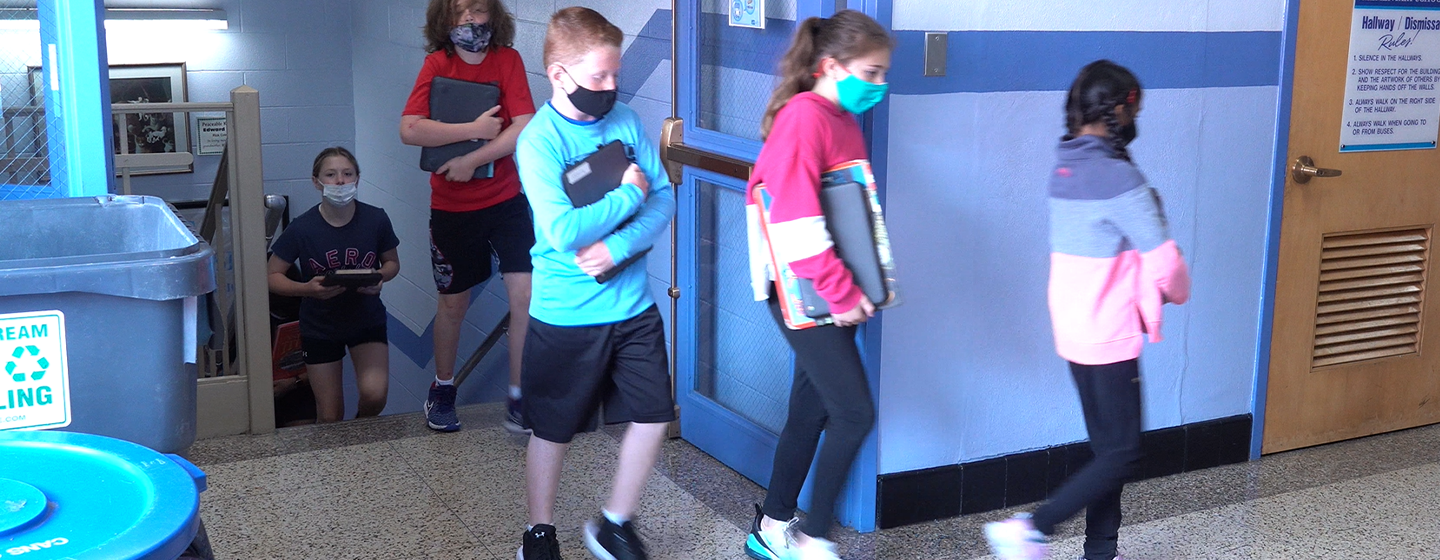
Schools Will Have to Follow Fewer COVID Rules This Fall, But Hochul Says the Concerns Aren't Over
Schools will have to follow fewer pandemic-related rules this fall, but Governor Kathy Hochul says the concerns aren't over yet.
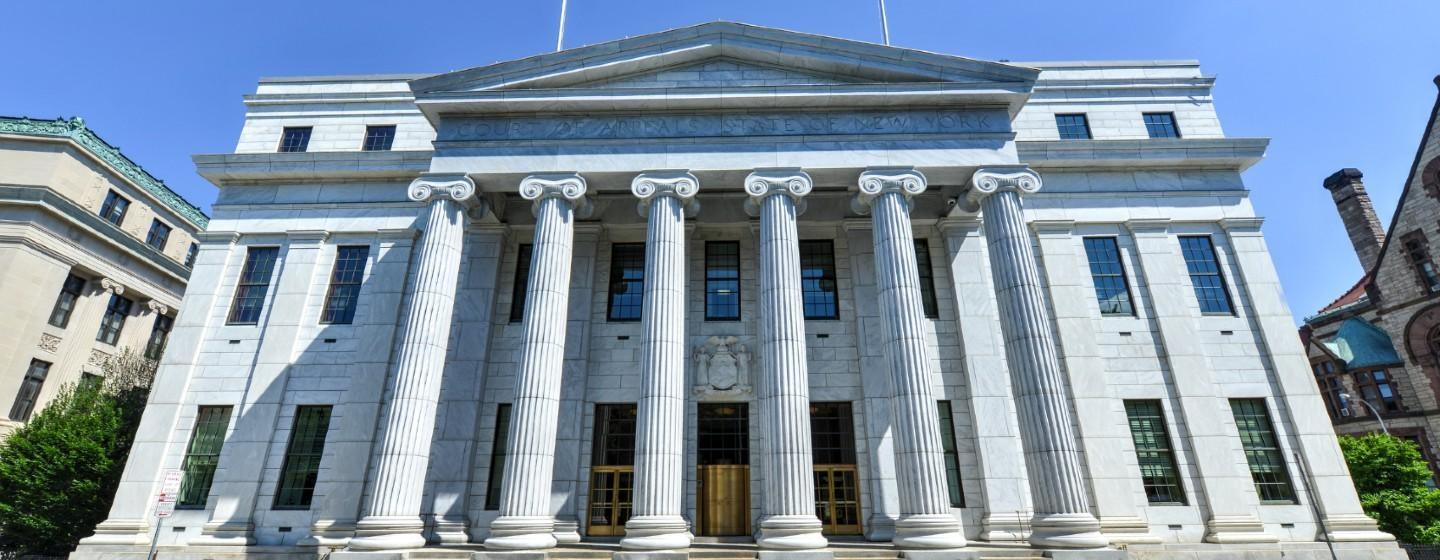
Progressive Groups Seek a New Chief Judge More Attuned to the Rights of the Vulnerable in Society
Progressive groups are asking Governor Hochul not to appoint another prosecutor when she chooses her replacement for the exiting Chief Judge Janet DiFiore.
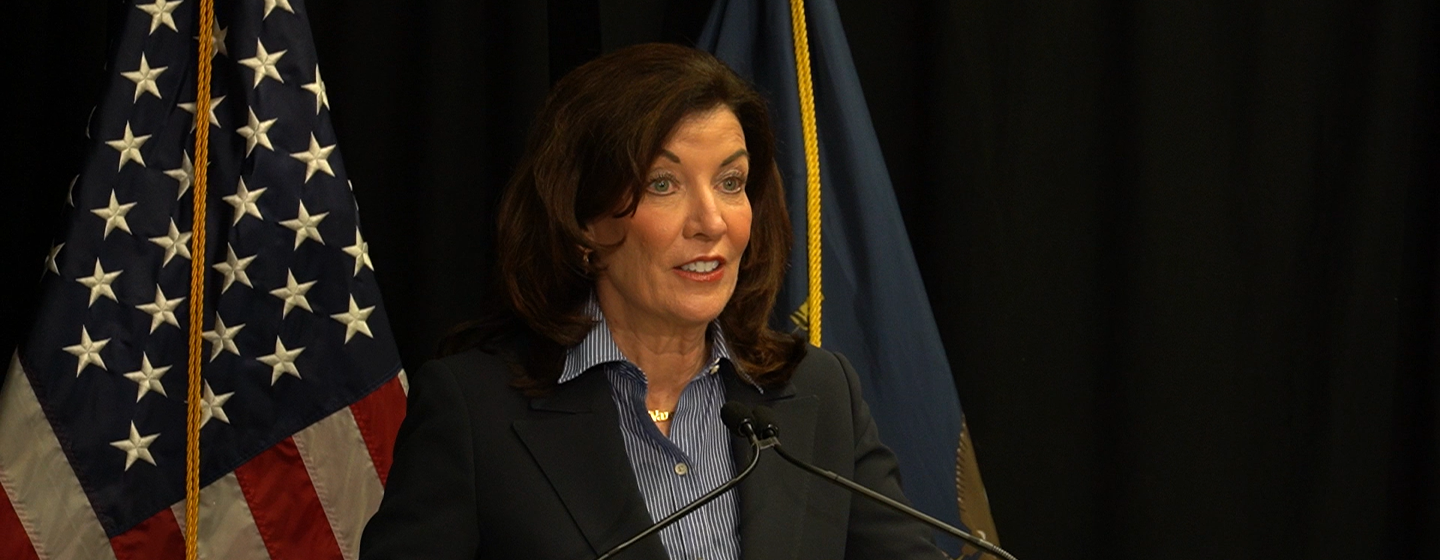
Hochul Says Red Flag Law Usage Has Doubled Since an Executive Order and New Laws Were Passed
Governor Kathy Hochul says gun safety laws passed after the Buffalo mass shooting that killed 10 people are reporting some success.


